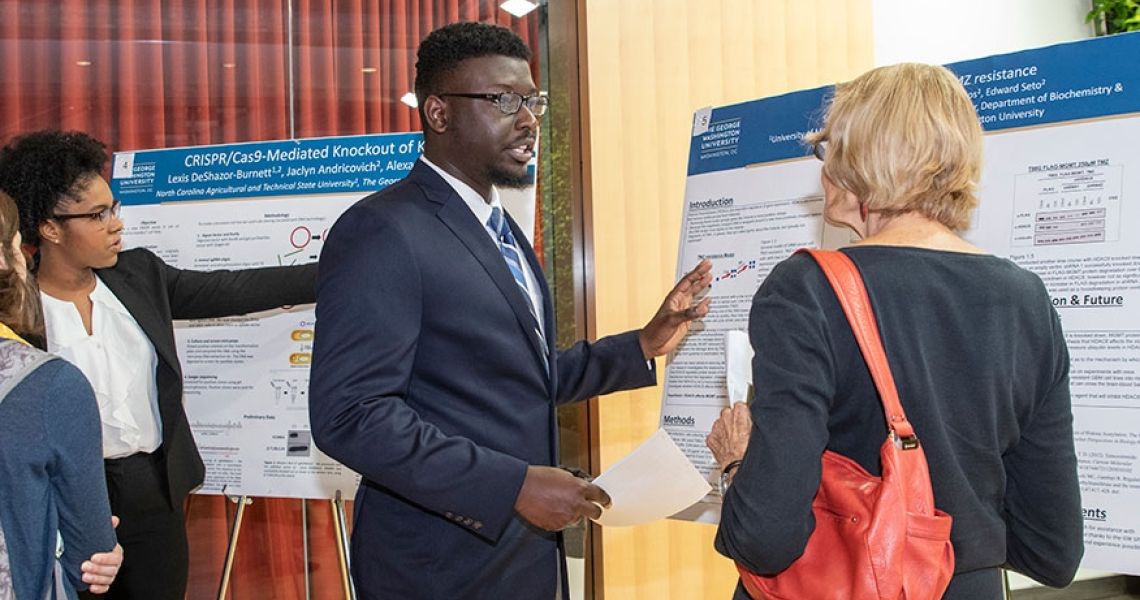Lexis Deshazor-Burnett, a rising junior at North Carolina A&T State University, credits the George Washington University (GW) Summer Program Advancing Research on Cancer (GW-SPARC) with opening her eyes to the myriad research paths she could follow.
Becoming a doctor was always her goal, she said, but once arriving at college, Deshazor-Burnett discovered a new passion: research.
Through GW-SPARC, she spent the summer in the lab of Alexandros Tzatsos, MD, PhD, assistant professor of anatomy and cell biology at the GW School of Medicine and Health Sciences (SMHS) and researcher at the GW Cancer Center. She assisted with using CRISPR, a revolutionary gene editing tool, to knockout KDM6A, a histone demethylase, in pancreatic cancer cell lines.
“I’m thinking about what I want to do, and it was great to see a lot of different types of people [at SMHS] with a lot of different careers,” she said. “It gave me a broader idea of what I could do after undergrad, and how I can satisfy each facet of what I want to do in my career.”
New to GW this year, the program is open to undergraduate school students from groups underrepresented in biomedical science and provides participants with a hands-on approach to cancer research. Students worked in laboratories focused on cancer immunology and immunotherapy; cancer biology, namely targeted therapies and epigenetics; and cancer engineering and technology.
The goals of GW-SPARC, according to Alison Hall, PhD, associate dean for research workforce development and professor of neurology at SMHS, who serves as co-director of the program, are to expand opportunities for potential researchers and enhance diversity in the biomedical research community.
“GW-SPARC not only exposes participants to cutting-edge research and contemporary cancer research techniques, but also fosters their understanding of health disparities and the impact of cancer in different communities,” said Hall.
Students attended workshops on topics including sample size and experimental design, applying to graduate and medical school, and how to make a research poster. They also sat in on seminars from GW Cancer Center researchers, such as Katherine Chiappinelli, PhD, assistant professor of microbiology, immunology, and tropical medicine at SMHS; Norman Lee, PhD, professor of pharmacology and physiology at SMHS; and Edward Seto, PhD, associate center director for basic sciences at the GW Cancer Center, King Fahd Professor of Cancer Biology, and professor of biochemistry and molecular medicine at SMHS, who is also a co-director of GW-SPARC.
Ann Obi, a rising junior at Prairie View A&M University, worked in Chiappinelli’s lab over the summer. She first was drawn to medicine after visiting family in Nigeria during a summer break in high school and realizing the lack of health care services available there.
Obi said working in Chiappinelli’s lab was an exceptional experience.
“Everyone is nice and understanding. I don’t have a strong research background, so they really made an effort to make sure I understood what was going on. Dr. Chiappinelli was very open to answering all my questions,” she said. “I learned a lot.”
In addition to their time in the lab, cohort members also were required to create a poster on their research and presented their findings to faculty and staff on the last day of the program.
Obi confidently presented her research to the crowd gathered in the Science and Engineering Hall that day, answering questions with a confident smile.
Before the presentation began, Hall and Seto said a few words to the students and attendees.
“This past week I had a chance to talk to a lot of the students and I asked them what they liked about the program, and a lot of them told me ... they were surprised that a lot of the faculty here, despite their busy schedules, were willing to sit down with them to talk with them and talk about their passion and how they got into science,” Seto remarked. “To the students, I want to say this is a mutual feeling. As a faculty member, I’ve learned a lot from you and benefited from the enthusiasm you’ve brought to this program.”
The GW Hospital Women's Board provided partial support for this initiative.
